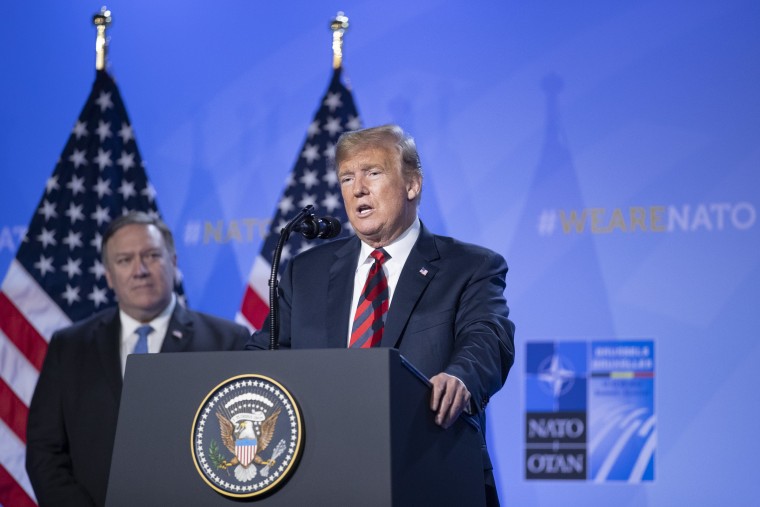Donald Trump did not play a constructive role at the G-7 summit in June, but away from the spotlight, diplomats from the various delegations successfully negotiated a joint communique reflecting the member nations' shared values. Everything was on track, right up until the American president threw a tantrum.
The day after the international gathering, Trump announced that he had "instructed" U.S. officials "not to endorse" the official G-7 communique. White House officials then spent some time blaming Canadian Prime Minister Justin Trudeau for apparently hurting Trump's feelings.
As we discussed last week, the American president's tantrum didn't amount to much. U.S. officials ended up ignoring Trump's instructions and American support for the communique was never formally withdrawn. But the experience left an impression on Trump's team, and as the New York Times reported overnight, officials took a series of steps to avoid a similar breakdown at last month's NATO summit.
Senior American national security officials, seeking to prevent President Trump from upending a formal policy agreement at last month's NATO meeting, pushed the military alliance's ambassadors to complete it before the forum even began.The work to preserve the North Atlantic Treaty Organization agreement, which is usually subject to intense 11th-hour negotiations, came just weeks after Mr. Trump refused to sign off on a communiqué from the June meeting of the Group of 7 in Canada.The rushed machinations to get the policy done, as demanded by John R. Bolton, the national security adviser, have not been previously reported. Described by European diplomats and American officials, the efforts are a sign of the lengths to which the president's top advisers will go to protect a key and longstanding international alliance from Mr. Trump's unpredictable antipathy.
It's an amazing dynamic to consider in the abstract: the American president has a tendency to be needlessly hostile toward the most successful security alliance in the world, but his aides don't share his antagonism. There was a real possibility that the former might reject the latest NATO communique, so the latter created conditions in which he wouldn't have that opportunity.
As the Times reported, the behind-the-scenes efforts began well ahead of the gathering, when White House officials decided the NATO statement shouldn't be negotiated during the summit, but rather, needed to be done before it began.
That way, Trump couldn't screw it up. The article added:
Generally, deputy NATO ambassadors and lower-level bureaucrats work on communiqués for months before an alliance summit meeting. It always includes last-minute wrangling over language, particularly as smaller nations use the leverage of an impending deadline to tweak issues sensitive to them.At a 2016 meeting in Warsaw, last-minute changes in the communiqué were shown to President Barack Obama. By contrast, American officials said, this year Mr. Trump was presented with only the broad outlines of what the meeting would deliver -- not details of the document of 79 paragraphs, running 23 pages.
In effect, the American president's team found it necessary to trick the American president.
Retired four-start Gen. James Stavridis, who once served as the supreme allied commander for Europe, told the Times, "The president's national security team did a good job of salvaging a minimally successful outcome to the NATO summit." But, he added, "it is unfortunate that the president's apparent personal animus continues to create friction in an alliance that has stood the test of time."
It's also unfortunate, of course, that the United States' amateur leader needs to be managed in such a way as to accommodate his misguided fits.
Politico reported last year that White House aides "have figured out that it's best not to present Trump with too many competing options when it comes to matters of policy or strategy. Instead, the way to win Trump over, they say, is to present him a single preferred course of action."
In other words, to prevent the president from making the wrong choice, officials have discovered the importance of taking away Trump's choices. As we discussed at the time, officials in the West Wing effectively found it necessary to trick the Leader of the Free World into doing what they think he should be doing.
Evidently, that hasn't changed.
